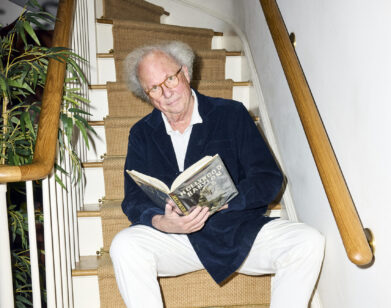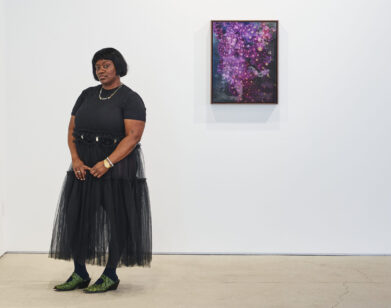How George Saunders Comes to Terms

ABOVE: GEORGE SAUNDERS. IMAGE COURTESY OF CHLOE AFTEL
Just before we hung up after interviewing writer George Saunders this week, he asked a favor.
“Just don’t make me cast aspersions on anyone,” he requested, in his particular bright, polite Midwestern tenor. “That’s my worst nightmare.”
Saunders had recently done a series of interviews with the New York Times Magazine‘s Joel Lovell, resulting in a long, lovely profile with a headline unusually laudatory for that publication: “George Saunders Has Written the Best Book You’ll Read This Year.” He’d worried throughout the process, he explained, that he would accidentally be less than gracious.
“That was actually one of my biggest concerns with that piece, because we really talked very frankly; and given my personality, I was so afraid I would say something that would hurt somebody’s feelings somewhere,” Saunders said. “That’s my Catholic issue.”
He needn’t have worried—about the Times interviews, or about ours. It’s not in Saunders’ nature to be cruel or even careless in his consideration of other people, which is probably why the word “compassion” ends up figuring into so much of the writing about his work. Each of the 10 short stories that make up his fourth collection, Tenth of December, is lit up with the kind of empathy that makes a reader ache. In the way a Saunders character speaks, or worries about his family, or tries and fails to do the right thing, you’ll recognize the foibles of people you love—and maybe, if you are uncommonly honest, yourself.
The stories are also very, very funny. Saunders is known for his satirical, speculative pop-culture riffs, which are less outsized here than in previous collections; but when he chooses to deploy them, it’s with hilarious precision. In one story, a character returns from a military deployment of unspecified length and walks into a store to find he doesn’t understand what it’s selling: “heavy blue-plastic tags” that read “MiiVOXmax.” He asks a clerk what it does, to a Beckettian response: “Well, if you’re asking is it data repository or information-hierarchy domain? The answer to that would be: yes and no.”
We talked to Saunders yesterday, two days after the release of Tenth of December and just under a week after the Times Magazine profile, as his book tour picks up steam. We picked up the phone, and he called us by name.
GEORGE SAUNDERS: Hi, Alex, it’s George Saunders.
ALEXANDRIA SYMONDS: Thank you so much for calling. Our timing is sort of funny—this is the week that TV networks announce what their schedules are going to be for next year, and a couple of the new shows sound like things you might have written.
SAUNDERS: [laughs]
SYMONDS: There’s a hidden camera show called Propos’d, where girlfriends who have nagged their boyfriends about getting engaged are subject to humiliating proposals; and one called Fat Girl Revenge, which is what it sounds like.
SAUNDERS: That is so sad. What are we coming to?
SYMONDS: Isn’t it? There’s less of that kind of thing in Tenth of December than in previous collections, but I did want to ask you whether writing speculative fiction about entertainment gets harder to do as actual entertainment gets more absurd. Or do you think that it’s not the case that it’s getting more absurd, just that it feels that way?
SAUNDERS: I think it’s getting more absurd; but then, theoretically, if a person wanted to riff on that, you can always go further. Personally, I just find that my interest in that has waned a little bit. Maybe it’s because I’m 800 years old, but in the last six years that I was writing this, I’ve just found my interest kind of coming back to a slightly more emotive or emotional place. And I think part of the challenge was to try to find the same kind of manic energy in those slightly more human situations, and to try and figure out a way to keep the language edgy and fun without going quite so far afield. It wasn’t really a conscious decision, but it somehow evolved in that direction. Maybe with that last book, the “Brad Carrigan” story, I’d gone about as far as I could. [laughs] And then I reeled myself back in a little bit.
SYMONDS: [laughs] Yeah, I don’t know what’s left after “Brad Carrigan.”
SAUNDERS: My role models were really early Chekhov and Guy de Maupassant, Steinbeck, and those kinds of guys—the more personal and emotional stuff is something I really feel drawn to. There’s fewer talking polar bears.
SYMONDS: [laughs] Right. In the acknowledgments, you write to your daughters that they’ve made you understand that “goodness is not only possible, it is our natural state”—which seems like a theme of this collection, more than previous ones. Have you come to believe that more as you’ve grown older?
SAUNDERS: Absolutely, yeah. And you put your finger on the reason. Because my wife and I have been married almost 26 years, and our kids are now grown. We’re very close, and they’re very dear kids—so anyone who’s had that kind of luck, as an artist, you have to kind of say, “Okay, that’s a possibility.” It’s not a guarantee, but it’s a possibility, so I felt myself aesthetically moving in the direction of wanting to incorporate that possibility.
The early books were kind of a little bit obsessed with the idea that things could go badly, which was sort of a revelation to me, I don’t know why. But then, in the last x number of years, you’re kind of like, wow, if you’re really going to account for all of reality—or try to—the possibility that you can be deeply in love with somebody for 26 years, have two completely adorable young people who grow into wonderful young women, that’s true. It’s as true as a school shooting, you know what I mean? It’s as true as anything that’s negative. So, one of my artistic challenges was to try to make a fictive world that hinted at that.
SYMONDS: I don’t want to harp too much about the Times Magazine piece, because I’m sure you’re tired of thinking about it by now, but…
SAUNDERS: [in a silly voice] Oh, I’m totally tired of hearing about that. Which part did you like the best?
SYMONDS: It seems like this collection had something to do with you making peace with the idea that you can be a generally happy artist.
SAUNDERS: Yes, that’s true. Or that that is an aspect of life, is to be genuinely happy. I think that’s right.
SYMONDS: I love the idea that maybe we can start to enter a literary era in which it’s okay to be happy.
SAUNDERS: Sure. If you really think back to the great writers, there’s a lot of happiness in Tolstoy; there’s a lot of love, there’s childbirth, and there’s dances. And likewise in Shakespeare and even Cervantes, there’s a lot of celebrations of the positive manifestations of life. Technically, I found it harder to do, so that’s kind of a good late-life challenge—without getting sentimental or chirpy.
SYMONDS: To ask something darker, then—a lot in the collection centers on the idea of diffusion of responsibility for, essentially, really atrocious acts. “Spiderhead,” “Exhortation,” “The Semplica Girl Diaries”—they all have funhouse-mirror versions of these platitudes we all tell ourselves every day about morally questionable things we do. I’m curious about whether there were any real-life analogues that you had on your mind while you were writing the stories.
SAUNDERS: Well, the Semplica Girl thing came out of a dream—and that was kind of weird, that my subconscious had that thing, at least the initial idea, fully formed. I don’t really tend to work from real-life corollaries, because when I do, the ones I chose are always kind of facile—I’ll come up with some idea that’s so obvious that it just sits there, you know.
So what I found after a lot of years of doing that was that if I narrowed my gaze into looking at sentences, or sections, or even phrases, or fictive moments: like concentrating, okay, the guy is walking into the bar, don’t worry about why, don’t worry about the theme, just get him into the bar in a convincing way that makes the reader lean in a little bit. Then, weirdly, or maybe not weirdly, all the other stuff kind of takes care of itself—theme and character and political content comes in on its own, probably because I really care about it. But the discipline for me is to really worry about the bit, the bit of prose, and trusting that all of that stuff will flood in of its own accord, if I keep that discipline.
SYMONDS: The Semplica Girls in particular are such an interesting externalization of what I think is generally a really interior, hidden subject—the foreign-born service worker. The idea of putting your Senegalese or Thai housekeeper on display in your yard is so jarring. It’s a really amazing story.
SAUNDERS: Well, thanks. It took me a long time to finish it. I started it, like, in ’98, with that dream, and then I couldn’t figure out what to do with it. There were a lot of easy things to do with it that were kind of preachy, but the trick was to try to take that image and build a world around it that it seemed born to [inhabit]. When I first had that dream, I was like, “Oh, it’s a dream about oppression.” Sure, it is, but if you write a story that’s just about that, then it’s going to be kind of boring. I was haunted by that story, because I could never have come up with that idea conceptually; but the subconscious—you know.
One thing that’s really interesting is the temptation, for me, is to kind of lie about it and make it more intellectual than it is. But in fact, that element of mystery and intuition, is actually about 99 percent of what I’m trying to engage with. It’s kind of hard to talk about; and I think in American criticism now, it’s sort of debunked a little bit, it isn’t really taken seriously. But my experience with being a writer is, about 99 percent of what you’re doing is trying to have intuitions and then following them, and then going back the next day and trying to have another set of intuitions and then following them. Which makes kind of a weird interview, but that actually is the real truth.
SYMONDS: In a couple of the stories, there are details that you don’t give the reader total access to—like in “Home,” what MiiVOXmax is; or in “Tenth of December,” what exactly Robin means by a “Nether.” When you’re constructing these worlds, how much access do you yourself have to what these things mean? Are you more or less aligned with the characters—you know what a Nether is because Robin does, and don’t know what MiiVOXmax is because Mikey doesn’t—or do you have a strong, complete sense of these worlds?
SAUNDERS: No, I know what they are, but I also know that in “Home,” he doesn’t know what it is, so my job is to kind of do both. I can know what it is and then run over to the other side of the table and see how it looks to him. I know what’s going on, but also remember that the story is coming through the lens of the character and that person would only know what he or she knows.
Often, practically what I would do is begin to put way too much in rather than go, “Wait, how did he know that?” Or, “Is it natural?” The bad example would be if somebody from the future was writing a historical novel about now, and they said, “George was talking to Alex on the ‘cell phone,’ a small handheld device,” because from my point of view, I would never think that way. So part of the fun for me is you kind of lay it out a little bit thick at the beginning and then you trim it back so that it’s more natural. My sense is that if I can get you leaning in a little bit, like, “Wait, what is that, what is an ‘SG?'” Then that’s part of our communication, for you to be looking at me, like, “Are you going to really leave me hanging?” And then six pages later, I give you a little more, and then you go, “Oh, okay.” That kind of thing is fun, I think.
SYMONDS: It totally made sense in “Home” that after being deployed for however long, you know Mikey would come home to this foreign thing which, to everyone else, is just commonplace. I would guess, because you were an engineer, you know about Moore’s law?
SAUNDERS: Remind me.
SYMONDS: That the number of transistors that can fit on a chip of a certain size roughly doubles every two years.
SAUNDERS: Oh, yeah, I knew that one. You bet I did. [laughs]
SYMONDS: Which is such a crazy thing—if I just went away for a few months and came back, would everything be different?
SAUNDERS: You could also just wait until you get to be 50. My wife and I just got cell phones last year—we had these big clunky ones that you can’t use. So for me, the fiction writer’s job is to take the small, stupid process of learning to use an iPhone—and suddenly you’re the guy who’s asking your daughter, “When I go on Facebook, can it see me?”
SYMONDS: [laughs]
SAUNDERS: Which is kind of comic. But that process writ large would look like the MiiVOXmax thing. You don’t have to be deployed, but you have to be willing to bring in your own kind of confusions and so on.
SYMONDS: I’m probably about your daughters’ age, and I don’t know if they had Tamagotchis, do you remember those?
SAUNDERS: Oh, yeah, sure. Those little things that you fed?
SYMONDS: Yeah, they were the size of a keychain, and they basically had like two buttons, and at age nine or whatever we were all addicted to them—we would just press these two buttons over and over again. When you compare that to what nine-year-olds are playing with now, on iPads—I feel like an old woman.
SAUNDERS: It is kind of amazing! This week, I’m touring now, and one thing I’ve noticed is I’m doing a lot of stuff on the phone and on the computer when I’m in the hotel, which I usually wouldn’t do. And I can feel my brain being rewired: I’m getting anxious, I’m getting more manic. Now, I’m an extreme case because I’m old and I’m overdoing it. [laughs] But still, it’s really interesting that I can actually feel a change in my neurochemistry from this interaction with the technology.
I always cheerfully say, “Well, you know, the species is adapting, and whatever it needs to do, it’ll do,” but I do think it’s maybe a little bit alarming. Everybody knows that one thing we really have to do is to be more wherever we are, more present, that’s just kind of a commonplace. And the whole phone thing is completely 100% the opposite—to never be where you are because you can always be somewhere else; and yet it’s so fun and addictive.
SYMONDS: Do you have a detox plan?
SAUNDERS: I really don’t. We live up in the hills, and we don’t have any cable, and we have really slow satellite, so that does it—because being on the Internet is okay, but it takes a long time. I have a prediction that at some point, there will be a backlash. Like at the end of the ’60s, there was that back-to-the-land movement, and I’m guessing that people will start consciously saying, “I’m not taking the phone with me,” or “I’m only checking email x number of times a day,” or “I’m not ever gonna self-Google,” for example. I think there will probably be a backlash, because I can tell, even from this week, that it’s really a toxic thing. And it’s a choice I’m making over and over again.
SYMONDS: Actually, if you don’t mind, what has the last week been like?
SAUNDERS: This week, that article was such a great, generous kind of cannon shot. I’m old enough now, it’s kind of just gravy. I’m glad it didn’t happen when I was 28 or something. It’s been really nice, and the way these things go is it’ll recede and I’ll be a total spoiled brat for about five days, like, “Why do I have to take the garbage out?” And then it’ll be fine, because I was lucky to have everything happen later, and to already have this really wonderful family life before it happened. I know where the real stuff is.
TENTH OF DECEMBER IS OUT NOW. GEORGE SAUNDERS WILL DISCUSS THE SHORT STORY WITH DEBORAH EISENBERG AND LUCAS WITTMANN AT THE STRAND TONIGHT, JANUARY 11, AT 7 PM.






